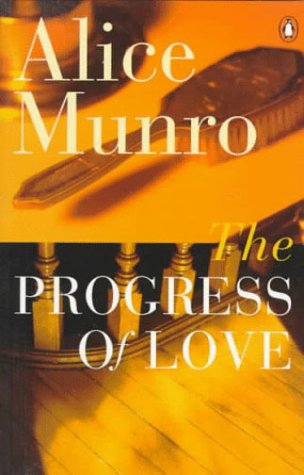I was blown away by Alice Munro's Lives of Girls and Women. It was one of those books that made me feel, this is what literature ought to be. But it wasn't really representative of Munro's body of work, which is defined by the short story. (Lives, though separated into titled stories, is really a novel about a single character, Del Jordan.) So I've been excited to read a collection of Munro's stories--do they have the same kind of depth and power?
Mostly, yes. The stories of The Progress of Love tread similar ground as Lives. They center around small moments in domestic life which have immense consequences, like ripples in water. Sometimes those consequences are literal ones, other times they are merely shades of feeling which resound throughout the lives of the characters. Many of these stories stretch over several years, and some decades. In Lives, Munro argued that the depth of experiences in ordinary lives is as profound as any other, calling these lives "deep caves paved with kitchen linoleum." The Progress of Love reads, sometimes, like an elaboration on this essential thesis.
One of my favorites was "Miles City, Montana," about a couple on a road trip who endure a frightening moment when their young daughter almost drowns in a swimming pool. Another, "The Moon in the Orange Street Skating Rink," is about a pair of brother who run away from a town where one of them has impregnated a young servant girl, only to find her having followed them, disguised as a girl, on to the train on which they were making their escape. It turns out to be a happy moment, full of the promise of a new life (in Toronto!), and a moment of sheer joy which the rest of their lives have trouble matching or living up to. In "Miles City, Montana" it's a moment of fear and shock, but like "The Moon," both moments seem to open briefly on another plane of life, one which is lived more intensely, and exists parallel to the ordinary one. Another story, "Fits," is about a practical housewife who seems not be affected by the discovery of a murder-suicide in the house next door. It, too, is about the way this other kind of life sometimes intrudes upon our own.
Other stories don't succeed as well. I was baffled by the extended dream sequence in "Eskimo," which otherwise takes place on an airplane. The longest story, "White Dump," is full of incredible moments--my favorite is a grandmother, swimming naked in a lake, who watches a group of hippies steal her cigarettes and destroy her bathrobe on the shore--but is such a chronological jumble that it's difficult to piece together in a meaningful way.
The one most similar to Lives--and therefore, I thought, one of the strongest--is "Jesse and Meribeth," which captures the nature of friendship between young girls, like Lives did. (At least, it seems to me to capture it, though maybe Chloe can confirm when her review of Lives goes up.) Jessie invents an affair with an older man to impress her friend Mary Beth, only to be rebuked by the man who has correctly intuited something of Jessie's family life:
Isn't it true that all the people I know in this world so far are hardly more than puppets for me, serving the glossy contrivings of by imagination? It's true. He has hit the nail on the head, as Aunt Ena is fond of saying. But hitting the nail on the head in a matter like things, in a matter of intimate failure, isn't apt to make people abashed and grateful and eager to change their ways. Pride hardens, instead, over the nakedly perceived fault. Pride hardens, pride deals with all those craven licks of sweetness, douses the hope of pleasure, the deep-seated glow of invitation. What do I want with anybody who can know so much about ne? In fact, if I could wipe him off the face of the earth now, I would.
It's these finely modulated expressions of human thinking that I find most powerful about Munro's work. There's nothing particularly earth-shattering about them--no formal boundary-pushing, no experimentalism--but she does it better than almost anybody.


1 comment:
I read a book of her short stories and have to agree - she is an excellent writer, but doesn't really give us anything earth shattering. Still, I guess one should always try to read things by a Nobel Prize winner.
Post a Comment